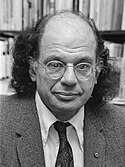Allen Ginsberg Quote
The grime was no man’s grime but death and human locomotives,all that dress of dust, that veil of darkened railroad skin, that smog of cheek, that eyelid of black mis’ry, that sooty hand or phallus or protuberance of artificial worse-than-dirt—industrial—modern—all that civilization spotting your crazy golden crown—and those blear thoughts of death and dusty loveless eyes and ends and withered roots below, in the home-pile of sand and sawdust, rubber dollar bills, skin of machinery, the guts and innards of the weeping coughing car, the empty lonely tincans with their rusty tongues alack, what more could I name, the smoked ashes of some cock cigar, the cunts of wheelbarrows and the milky breasts of cars, wornout asses out of chairs & sphincters of dynamos—all theseentangled in your mummied roots—and you there standing before me in the sunset, all your glory in your form!
The grime was no man’s grime but death and human locomotives,all that dress of dust, that veil of darkened railroad skin, that smog of cheek, that eyelid of black mis’ry, that sooty hand or phallus or protuberance of artificial worse-than-dirt—industrial—modern—all that civilization spotting your crazy golden crown—and those blear thoughts of death and dusty loveless eyes and ends and withered roots below, in the home-pile of sand and sawdust, rubber dollar bills, skin of machinery, the guts and innards of the weeping coughing car, the empty lonely tincans with their rusty tongues alack, what more could I name, the smoked ashes of some cock cigar, the cunts of wheelbarrows and the milky breasts of cars, wornout asses out of chairs & sphincters of dynamos—all theseentangled in your mummied roots—and you there standing before me in the sunset, all your glory in your form!
Related Quotes
About Allen Ginsberg
Best known for his poem "Howl", Ginsberg denounced what he saw as the destructive forces of capitalism and conformity in the United States. San Francisco police and US Customs seized copies of "Howl" in 1956, and a subsequent obscenity trial in 1957 attracted widespread publicity due to the poem's language and descriptions of heterosexual and homosexual sex at a time when sodomy laws made (male) homosexual acts a crime in every state. The poem reflected Ginsberg's own sexuality and his relationships with a number of men, including Peter Orlovsky, his lifelong partner. Judge Clayton W. Horn ruled that "Howl" was not obscene, asking: "Would there be any freedom of press or speech if one must reduce his vocabulary to vapid innocuous euphemisms?"
Ginsberg was a Buddhist who extensively studied Eastern religious disciplines. He lived modestly, buying his clothing in second-hand stores and residing in apartments in New York City's East Village. One of his most influential teachers was Tibetan Buddhist Chögyam Trungpa, the founder of the Naropa Institute in Boulder, Colorado. At Trungpa's urging, Ginsberg and poet Anne Waldman started The Jack Kerouac School of Disembodied Poetics there in 1974.
For decades, Ginsberg was active in political protests across a range of issues from the Vietnam War to the war on drugs. His poem "September on Jessore Road" drew attention to refugees fleeing the 1971 Bangladeshi genocide, exemplifying what literary critic Helen Vendler described as Ginsberg's persistent opposition to "imperial politics" and the "persecution of the powerless". His collection The Fall of America shared the annual National Book Award for Poetry in 1974. In 1979, he received the National Arts Club gold medal and was inducted into the American Academy of Arts and Letters. He was a Pulitzer Prize finalist in 1995 for his book Cosmopolitan Greetings: Poems 1986–1992.
